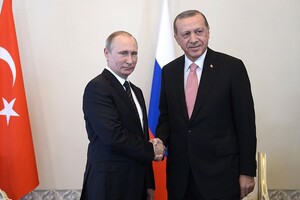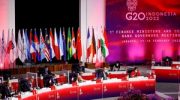Putin's audacity and his desire to escalate the war are disconcerting even to those who have tolerated his behavior until now.

Turkey, India and China react coolly to the news about planned referendums in the Russian-occupied regions of Ukraine, writes The Guardian.
Signs that some countries that have put up with Russia's invasion of Ukraine are losing patience came as Turkey, India and China reacted coolly to the announcement that referendums on joining the Russian Federation are planned in four Ukrainian regions occupied by Russia.
Turkey, which until now has been an active mediator between the West and Russia, strongly criticized the plans, saying in a statement that it was concerned about attempts to organize such referendums.
“Such an illegitimate fait accompliswill not be recognized by the international community. On the contrary, it will complicate efforts to revive the diplomatic process and deepen instability,” the statement said. “We reiterate our support for the territorial integrity, independence and sovereignty of Ukraine, which we have emphasized since the illegal annexation of Crimea in 2014, and we reiterate our readiness to provide all necessary support for a peaceful resolution of the ongoing war.”
President of Turkey Recep Tayyip Erdogan stated at a briefing in New York that he always supported the territorial integrity of Ukraine.
Erdogan appeared to be surprised by Putin's announcement of the mobilization, given that he had told the US Public Broadcasting Service a few days earlier that he felt his Russian counterpart was willing to make concessions.
Recalling the recent discussion with Putin, he told PBS: “He's actually showing that he's ready to end this as soon as possible. That was my impression, because given the way things are going, it's quite problematic.”
Erdogan is not the first world leader to end his meeting with Putin on a false note, but Turkey faces other problems as well.
The country's banks are under increasing US sanctions pressure to break away from Russia . Two private institutions, Denizbank and Isbank, suspended use of the Russian payment system Mir this week after Washington expanded its sanctions against Russia, including against the head of an organization that “By peace”. Although Turkey will never be cut off from Russia economically, business has fallen.
Indian Prime Minister Narendra Modi, who was praised by French President Emmanuel Macron this week for telling Putin to his face that now is not the time for war , are already calling to accompany their comments with concrete actions.
India's refusal to take sides, or what Delhi likes to call high-wire ball juggling, has long been a source of irritation. Jen Psaki, the White House press secretary at the time, urged the country in mid-March to think about “where you would like to be when the history books are being written.”
Indian Foreign Minister Jaishankar at a session at Columbia University this week only mentioned Ukraine in passing, but suggested that his country was biased against the United States.
“For almost 50 years, for various reasons — I'm not saying it was our fault or the U.S. was to blame — but the fact was that we treated the U.S. with suspicion and a lot of wariness,” he said. — It was a very serious relationship, but the general assessment of US foreign policy caused deep caution, if not deep suspicion. It took us a lot of effort to overcome previous assumptions in order to establish a different relationship with the United States.”
This was also reflected in India's approach to Ukraine, where it took small steps away from neutrality. The country has consistently referred to compliance with the UN Charter, condemned the war crimes committed in Buch and voted for Ukrainian President Volodymyr Zelensky to be allowed to address the UN Security Council via video link.
Also read: FT: India and China are unhappy with Putin's war, but they don't support Ukraine either
China is a stronger nut and its often opaque statements can be interpreted ambiguously. China may still believe that an alliance with Russia is necessary to keep Washington in check, but statements this week from a foreign ministry spokesman suggest it is unlikely to approve of Putin's game.
One the former British foreign secretary said that Russia has maintained deep ties with countries around the world and has allies that are still ready to push back against the West and find reasons to justify Moscow's actions.
Related video
About the neutral camp he said this: “I believe that they will want to protect themselves in the event of Russia's defeat, so they should be open to the West. Now it is clear that Russia cannot win, but it is obviously not the same as losing.”


